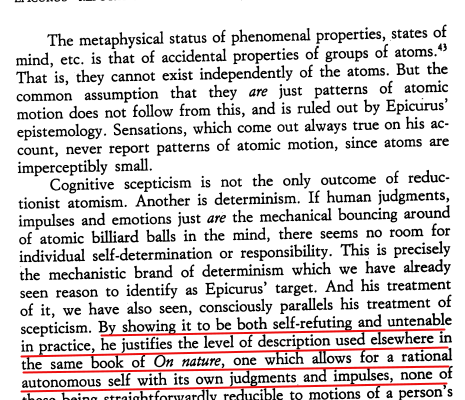Epicurus’ Refutation of Determinism – A 1983 Article By David Sedley
By chance today I came across from the Academia website a 1983 article which is the best treatment of this topic I have ever seen. David Sedley is an outstanding scholar who is generally very sympathetic to Epicurus, and this article brings together the familiar passages from Lucretius with Sedley’s interpretations of Herculaneum fragments from Epicurus’ “On Nature.” The result is a persuasive picture of the approach Epicurus took to refuting determinism, and how the swerve fits in as a physics observation that allows human agency, without an understanding of the precise the mechanism being necessary to the broader logical argument in favor of agency. I highly recommend this article on this important topic to all serious readers of Epicurus. Article can be downloaded at Academia or the link below, where there will be an ongoing discussion thread.
Key thought: Epicurus’ version of atomism was not of the “reductionist” variety.
The information in this article has implications far beyond the often-tedious and never-ending arguments about “determinism vs free will.” What’s really being discussed here is how we can integrate in our minds that we are in fact made up of combinations of atoms and void, without concluding erroneously from that observation that we’re no more than dirt. People think that atomism leads to nihilism, and it can definitely be used that way in the wrong hands, but that’s not Epicurus. Epicurus observes the workings of the atoms and the void and doesn’t end up with a despairing scream, but with an understanding of the reverse, that life is too precious to waste in confusion about the true nature of things and by giving in to fantasies about the way we might wish the world would be.
The information contained here could just as well lead to an article entitled “Epicurus’ Refutation of Skepticism and Nihilism.”

